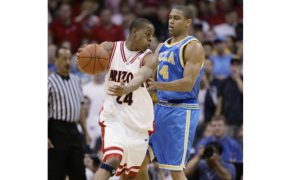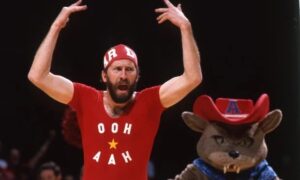Imagine the impact The Fox, a major college basketball coach who was lighting the fancy of Tucson much like Adia Barnes is doing now, made on a 6-year-old boy inviting me and my brothers to the locker room to get autographs from the Arizona basketball players.
Our dad would allow us to wait at the brand new McKale Center after games to watch Fred Snowden do his postgame television show on KZAZ Channel 11. I sported a big afro. It was the 1973-74 season. Afros and long hair were en vogue. Snowden had one also. I remember him patting me on top of my head and taking a good liking to me.
When Snowden told us we could follow him into the locker room, it was like getting an escort into Disneyland. As I grew older, I thought Snowden was nicknamed “The Fox” because of that charisma, that smooth personality that won people over like Tucson had never seen before.
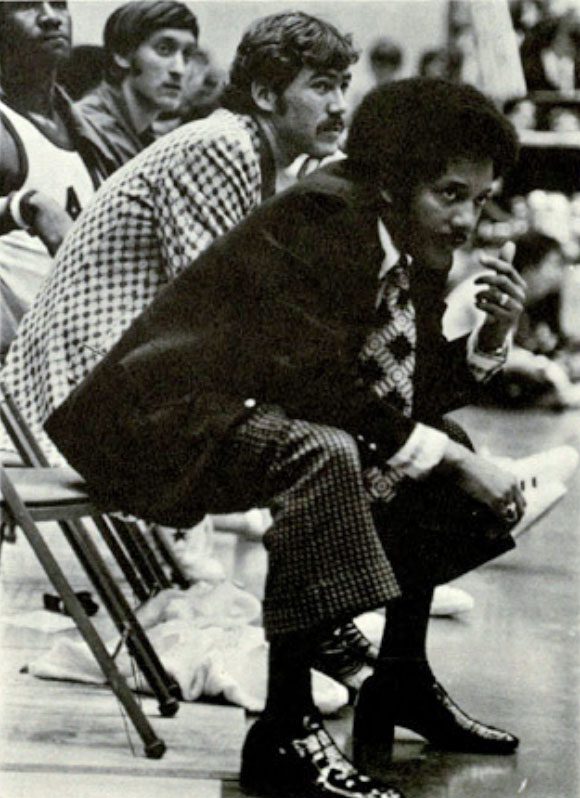
Years later, when Snowden was inducted into the Pac-12 Hall of Honor in 2015, I discovered the true meaning of his nickname, which became as legendary as Snowden, the first African-American to coach a major college basketball program.
His daughter Stacey Snowden, a delightful woman who carries the same people skills as her dad, informed me of the story behind “The Fox” nickname when she took part in the Pac-12 Hall of Honor ceremony at the MGM Grand at Las Vegas.
“That name goes back to his days at Michigan, actually when he played baseball,” Stacey said. “My father was a very talented baseball player and was actually drafted into the Detroit Tigers franchise. But he didn’t want to play baseball.
“He was an educator. Basketball was his first love. He loved baseball, too. He was as sly as a fox playing baseball, so that’s where it really started. I guess he was pretty slick out there.”
Fred Snowden, who passed away from a heart attack in 1994, would have celebrated his 84th birthday today.
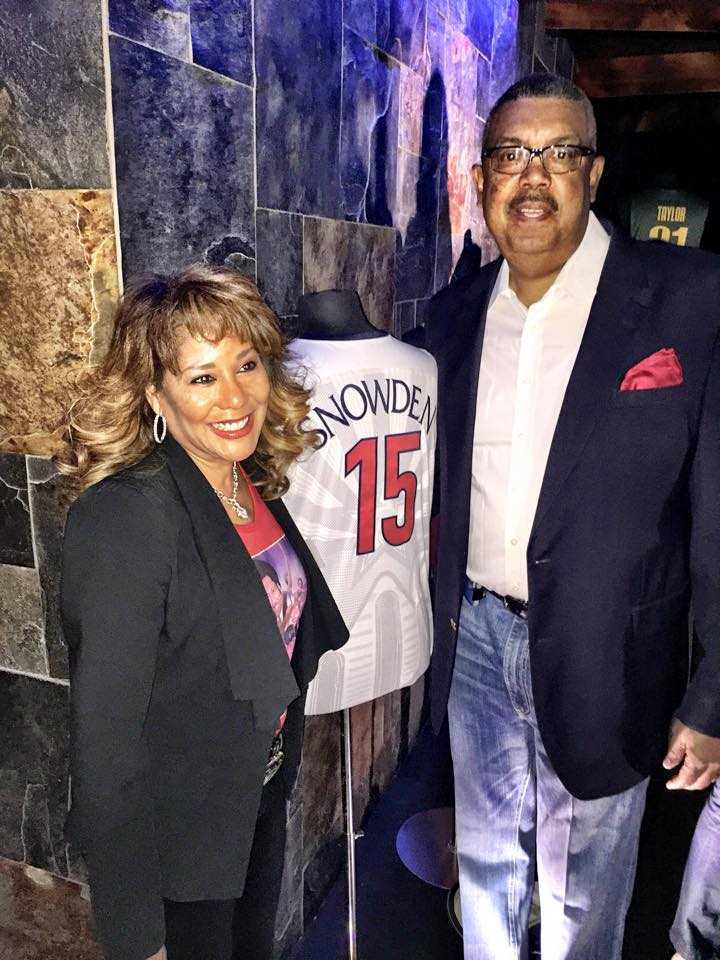
He was recently honored by KVOI (1030-AM) as part of its Tucson History Podcast with the recording of “The Desert Fox.” The podcast details how Snowden made Tucson a relevant basketball town almost 50 years ago. Here is the audio for that podcast:
Stacey has told me that whenever her dad’s name comes up it “allows younger people to know there is always someone before you to open the door and create these opportunities. Fred Snowden happened to be that person as far as college coaching for African-American coaches.”
Upon his hire at Arizona as a Michigan assistant in 1972, The Fox established a recruiting base in the Midwest, far from the traditional recruiting grounds of the southwest Arizona was accustomed to under predecessor Bruce Larsen.
The late Arizona athletic director Dave Strack, who knew Snowden from their days at Michigan, lured the coach with the premise that “we have the opportunity to really build something really special here,” Stacey said.
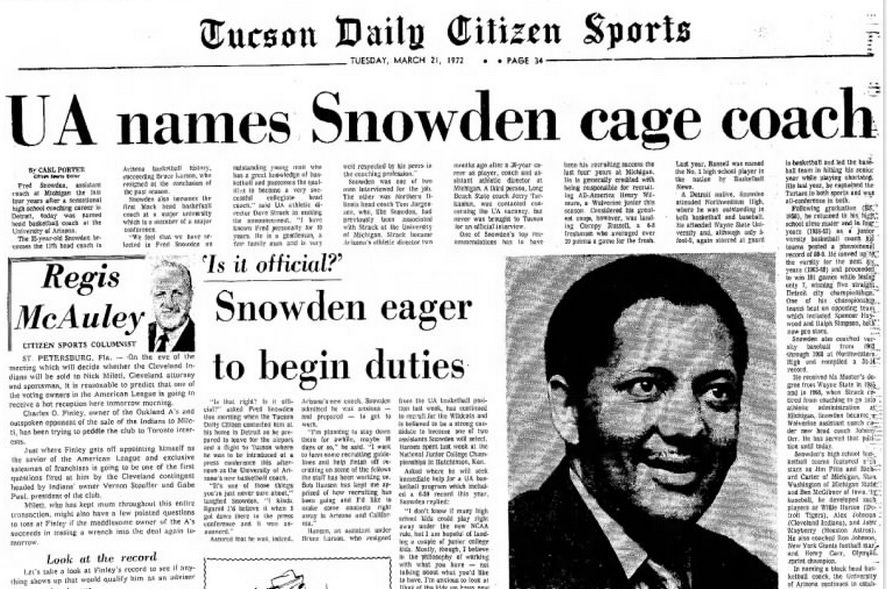
Fred Snowden saw promise in Arizona’s program despite a humble and sometimes very difficult beginning in Tucson.
“The early years were not easy on a personal level,” Stacey said. “There was not a lot of acceptance and racial tolerance and so forth at that time. We lived under the constant threat of life with death threats and bomb threats all of the time.
“That was really difficult, but we persevered and got through it. My father knew that as a pioneer these are the types of things you have to endure. He got through it and created something really, really special in the Arizona basketball legacy.”
In his very first recruiting class that were freshmen in 1972-73, The Fox became a sensation bringing in a historically talented group — the “Kiddie Korps” — that consisted of Eric Money, Coniel Norman, Al Fleming, Jim Rappis and John Irving. He later brought Tucson the likes of Bob Elliott, Gilbert Myles, Phil Taylor, Herman Harris, Joe Nehls, Russell Brown and Larry Demic.
Midway through the 1972-73 season, the Wildcats shifted from the old Bear Down Gym to the new McKale Center. More than 13,000 started to fill the capacity at McKale, watching Snowden’s fast-paced, high-scoring style of basketball.
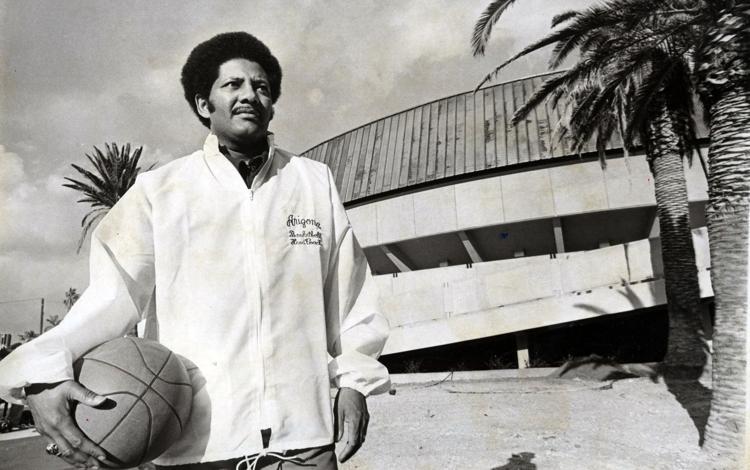
“They couldn’t fill Bear Down Gym when we first got there,” Stacey said. “I remember my dad being kind of, ‘Wow, what did I get myself into here, going from Michigan to this little Bear Down Gym?’
“But McKale was on the horizon, about to be opened. After my dad got there, that first season they started to fill up Bear Down. Then we opened McKale Center and it was a packed house and it was magical. That really set the pace for Arizona basketball. McKale has been basically full and sold out ever since. It was a great legacy to be part of.”
A concern of Stacey’s is Arizona’s younger generation of fans — those born since the 1980’s — will not appreciate what her father built in Tucson.
The Wildcats went as far as the Elite Eight in his fourth season in Tucson in 1975-76. Players from all over the country were coming to Tucson to be part of his fast-breaking style of basketball.
Lute Olson was impressed by Snowden’s popularity when his Iowa team faced Arizona at a Hawaii holiday tournament in 1975. He became fascinated when he noticed Snowden’s postgame TV show was airing after the game.
“I realized then that Fred had the makings of a big-time program,” Olson told me when I covered the Wildcats for The Arizona Daily Star in the late 1990s.
“I have heard Lute say that before,” Stacey said. “If there wasn’t a Freddie Snowden and what he built here, Lute was not so sure he would have taken a look at Arizona. It’s part of the wonderful basketball legacy Arizona has become.”
FOLLOW @JAVIERJMORALES ON TWITTER!
ALLSPORTSTUCSON.com publisher, writer and editor Javier Morales is a former Arizona Press Club award winner. He is a former Arizona Daily Star beat reporter for the Arizona basketball team, including when the Wildcats won the 1996-97 NCAA title. He has also written articles for CollegeAD.com, Bleacher Report, Lindy’s Sports, TucsonCitizen.com, The Arizona Republic, Sporting News and Baseball America, among many other publications. He has also authored the book “The Highest Form of Living”, which is available at Amazon.












